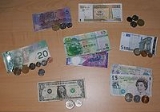
Currency
Overview
Economics
Economics is the social science that analyzes the production, distribution, and consumption of goods and services. The term economics comes from the Ancient Greek from + , hence "rules of the house"...
, currency refers to a generally accepted medium of exchange
Medium of exchange
A medium of exchange is an intermediary used in trade to avoid the inconveniences of a pure barter system.By contrast, as William Stanley Jevons argued, in a barter system there must be a coincidence of wants before two people can trade – one must want exactly what the other has to offer, when and...
. These are usually the coins
COinS
ContextObjects in Spans, commonly abbreviated COinS, is a method to embed bibliographic metadata in the HTML code of web pages. This allows bibliographic software to publish machine-readable bibliographic items and client reference management software to retrieve bibliographic metadata. The...
and banknotes of a particular government, which comprise the physical aspects of a nation's money supply
Money supply
In economics, the money supply or money stock, is the total amount of money available in an economy at a specific time. There are several ways to define "money," but standard measures usually include currency in circulation and demand deposits .Money supply data are recorded and published, usually...
. The other part of a nation's money supply consists of bank deposits (sometimes called deposit money), ownership of which can be transferred by means of cheque
Cheque
A cheque is a document/instrument See the negotiable cow—itself a fictional story—for discussions of cheques written on unusual surfaces. that orders a payment of money from a bank account...
s, debit card
Debit card
A debit card is a plastic card that provides the cardholder electronic access to his or her bank account/s at a financial institution...
s, or other forms of money transfer. Deposit money and currency are money
Money
Money is any object or record that is generally accepted as payment for goods and services and repayment of debts in a given country or socio-economic context. The main functions of money are distinguished as: a medium of exchange; a unit of account; a store of value; and, occasionally in the past,...
in the sense that both are acceptable as a means of payment.
Money in the form of currency has predominated in human civilizations from about 10,000 BCE on.
Unanswered Questions
Discussions

